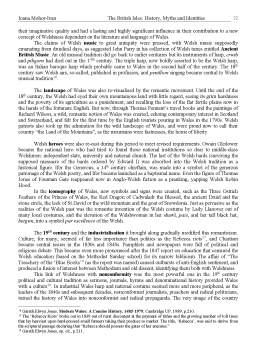Extras din curs
PRELIMINARIES
In 1932 the Methuen Books published a series of books on the four nations making up The United Kingdom, the fourth of which was H. V. Morton’s In Search of Wales. In the introduction to his book Morton touches upon an outsider’s perceptions of Wales and Welshness, listing some of the stereotyped projections of national or racial characteristics:
Wales, I feel, is going to be interesting. She is, of the three sister nations which, with England, compose the British Isles, the smallest and the most mysterious. I wonder, as I find my way out of London, what any man in the street would reply if I asked him:
“What does the word ‘Wales’ convey to you?”
He might possibly reply:
“The Prince of Wales, Lloyd George, the Eisteddfod, Snowdon, Welsh Rarebit…”
There he might stick. Perhaps a more literate member of the public might add:
“St. David, Fluellen, Parson Evans in The Merry Wives of Windsor, leeks, pictures of Caernarvon Castle in railway carriages, mine disasters, and Cardiff.”
Someone might even recite the old libel that has stuck so hard to Wales and the Welsh:
Taffy was a Welshman,
Taffy was a thief.
As Tony Curtis notes, one could locate here the irony proper to the small nations’ efforts to preserve their sense of a discrete identity: in order to achieve it, they might have to construct a set of national characteristics which, in fact, caricature those underlying qualities they hope to secure.
Wales, a small part of the United Kingdom, displaying many of the attributes which point to an organic nation, such as the unity in the history of the land and of its people, or the linguistic unity as most Welsh people spoke Welsh until the beginning of this century has had to accommodate the paradoxical situation of not being, at the same time, conterminous with a political state. To this, one may add the continuing pressure from an economically and culturally dominant neighbour that explains the Welsh need to construct a set of ‘national’ characteristics and revert to imagination, myths, generalisations and images that would sustain its cohesion and secure its survival.
This process of ‘imagining and re-imagining’ Wales and Welshness is closely linked to a historical narrative that has shaped the psychology of the nation, imbuing it with an easy propensity for myths and myth-making as an influential factor in the process of the Welsh self-definition.
2. HISTORICAL NARRATIVES AND MYTHS OF WELSHNESS
During the earliest centuries of Welsh history, a period stretching from the end of the Roman Empire up to the Norman Conquest, the Welsh, known by the name of Brythons along with the other Celtic-speaking peoples south of Firth of Clyde and Firth of Forth, had managed to secure their own political institutions, being the only country in the Roman Empire to resist conquest after its fall. Despite the fact that her government was shared between a number of small states, Wales was united by a shared history in a common territory, by a common Celtic language and culture, by a Celtic Church and a Christian religion, which towards the end of this period came to differentiate the Cymry from the people to the east of them. This community shared some cultural and religious characteristics with the other five Celtic people from Brittany to Scotland, with whom there were close Welsh relationships in the 5th and 7th centuries.
The name Welsh was given to the inhabitants of this western peninsula with the next centuries of Anglo-Saxon invasions, deriving from the continental experiences of the invaders with “romanised foreigners”.
The Anglo-Saxons managed to cut the territories of the Welsh into three distinct parts - Strathclyde in the north, Wales in the centre and the Devonian-Cornish peninsula in the south -, but the wide extent of the mountain area brought them to a halt behind Offa’s Dyke .
In point of the continuous process of definition for Wales and its people, one could notice here both an inward and an outward direction. The Welshmen acquired self-awareness due to being continually subjected to attacks from Irish raiders, in the east, and Anglo-Saxon conquerors in the south-west, defining thus themselves as “fellow-countrymen”, while the invaders, in their turn, considered the Welsh “foreigners”, with a clear-cut distinction being made between their cultures, as both Offa’s Dyke and the name of Mercia itself demonstrate.
Even during those early centuries, the Welsh used history and myth to sustain their spirit. There were myths of origin, for example the long-cherished Brutus myth according to which the Britons had taken their name from an eponymous founder, a Roman consul Brutus, or, as other legends said, from an earlier eponymous hero, one Britto from Troy. There were also myths referring to the emergence of the Welsh from the ruins of a later Roman empire, involving the characters of the British or Welsh leader Vortigern and the Saxon leader Hengist , which linked the Saxon invasion with the story of a bloodful plot .
Thus the retreating, ever more constricted Welsh people were sustained by telling themselves that they were the primary people of the British Isles, that the origin of their government and ruling families was Roman and Imperial, and that their power had been diminished by foul, not fair means. More than these, another myth assumed that they had been Christian for centuries (perhaps since the visit of Joseph of Arimathea to Britain), all that made them utterly different from the pagan Anglo-Saxons with their recent veneer of Christianity.
Preview document
Conținut arhivă zip
- The Matter of Wales.doc





























